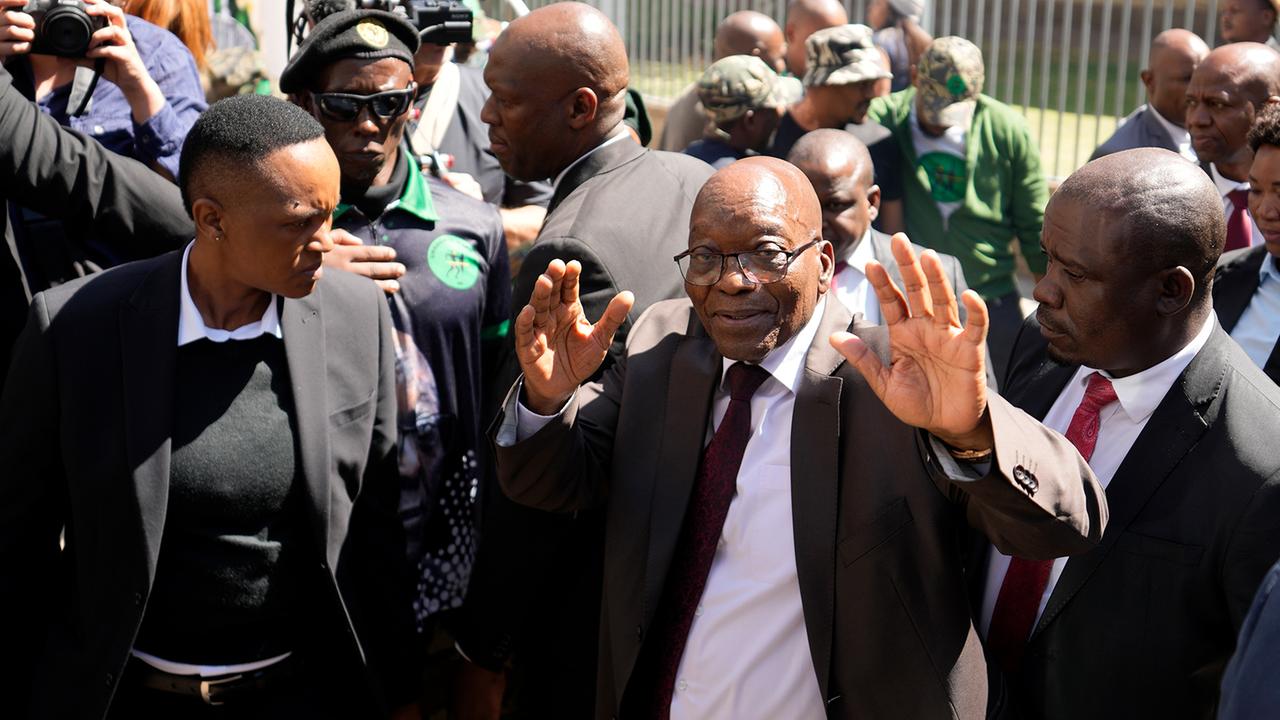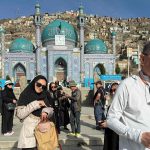The South African Constitutional Court has excluded 82-year-old former President Zuma from next week's parliamentary elections. Fears of unrest are high – his supporters are threatening violence.
Television stations are broadcasting live, Zuma fans have gathered in front of the Constitutional Court, and public interest is huge. No wonder, since the Constitutional Court, South Africa's highest court, had to decide on an extremely explosive legal dispute.
Far-reaching decision of the court
The proceedings were not just about the political future of an 82-year-old. They were also about the question of whether the provisions of the state constitution apply equally to all candidates in the parliamentary election next week – and thus about the credibility and legitimacy of this election as a whole.
The judges had to decide whether former President Jacob Zuma could run for a seat in parliament despite his criminal record.
Supporters of Jacob Zuma protest in front of the Constitutional Court in South Africa.
Zuma had a criminal record
It sounds like a legal quibble, but it isn't. Anyone sentenced to one year in prison or more is not allowed to run for office for five years after the expiration of their sentence – that's what the South African constitution says.
According to the country's electoral commission, this is exactly what applies to Jacob Zuma. In the summer of 2021, he became the first former head of state in South Africa's history to be sent to prison for 15 months for refusing to testify in court about the rampant corruption during his term in office.
Zuma has State-owned enterprises exploited
According to an independent investigation report, during his time in government from 2009 to 2018, Zuma, together with accomplices in politics and business, literally seized control of the country and systematically plundered state-owned companies such as the electricity supplier Eskom and the railway company Transnet.
However, Zuma was released after just three months behind bars for health reasons. The rest of his sentence was pardoned by the incumbent President Cyril Ramaphosa. Zuma had therefore argued that the 15-month sentence was also invalid and that nothing stood in the way of his candidacy.
Furthermore, he was not punished for a crime, but “only” for ignoring court orders. And whether he is allowed to stand in the election should not be decided by a court, but later by the newly elected parliament.
But South Africa's highest court sees things quite differently. A verdict is a verdict, and even a pardon cannot change that, that is the final decision of the country's highest judges.
Ballot papers already printed
According to legal experts, the proceedings have put the constitutional judges in a difficult position so shortly before the parliamentary elections. Because, of course, the legal decision also entails serious political consequences.
Without its star candidate Jacob Zuma, the MK party could find it much more difficult to steal votes from the ANC on election day – even though Zuma's name and face will still be on the ballot papers. They are already printed and cannot be changed so close to the election.
Zuma supporters threaten violence
In a joint appeal, 40 non-governmental organizations are calling on all those involved to respect the decision of the country's highest court. There is great concern that the unrest of 2021 will be repeated. Shortly after the verdict against Jacob Zuma, more than 300 people were killed in riots. Supporters of the former president had recently openly threatened new violence if Zuma were excluded from the parliamentary elections.
Zuma polarizes the country
Zuma polarizes South Africa like no other politician. This has been especially true since he announced that he would head the newly founded MK party in the upcoming parliamentary elections. On Saturday, Zuma appeared confident at a campaign event and announced his goal of a two-thirds majority.
However, according to current polls, MK is far from that. However, the former ANC leader and president still has many supporters, especially in the Zulu ethnic group, to which he himself belongs – despite all the allegations of corruption.
Zuma’s former party turned against him
The ruling African National Congress (ANC) had tried several times in vain to stop its former chairman by legal means. Among other things, the ANC wanted to ban the new Zuma party from using the name MK. MK stands for “Umkhonto we Sizwe”, which translates as “Spear of the Nation”. This was the name of the armed wing of the ANC during the apartheid regime. This lawsuit was rejected, as was the demand that MK not be allowed to stand in the parliamentary elections.
More and more allegations surfaced
For weeks, new accusations have been made against Zuma's party. Among other things, MK is said to have fraudulently obtained registration as a political party using forged signatures. There is also trouble with MK founder Jabulani Khumalo, who was allegedly expelled from the party at Zuma's instigation and now claims that his letter of resignation was forged by Zuma's daughter, of all people.
Even after the Constitutional Court's decision that Zuma is not allowed to run in the parliamentary elections in South Africa, the controversial ex-president and his new party will continue to cause political turbulence.





